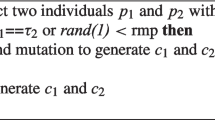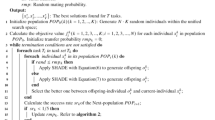Abstract
Multiobjective multifactorial evolutionary algorithm (MOMFEA), which solves multiple tasks simultaneously based on a single population, has received considerable attention in recent decades. However, the negative transmission usually leads to slower convergence or worse distribution. To make use of the potential similarity between different tasks, this paper proposes an enhanced version for the MOMFEA using a reference-point based nondominated sorting approach (denoted as MFEA-RP). By using Multiple Dimensional Scaling, subtasks in different dimensions can be optimized simultaneously with a single set of reference points. The efficiency of the method is substantiated by multiobjective benchmark problems and practical instances. In most of the test probability, MFEA-RP converges faster to the true Pareto front. Better-distributed solutions are successfully found, which indicates the better representativeness to the solution space.






Similar content being viewed by others
Availability of data and materials
Data sharing not applicable to this article as no datasets were generated or analysed during the current study.
Code availability
Not applicable.
References
Gupta A, Mańdziuk J, Yew-Soon O (2015) Evolutionary multitasking in bi-level optimization. Complex Intell Syst 1:1–4. https://doi.org/10.1007/s40747-016-0011-y
Abhishek G, Yew-Soon O, Liang F (2016) Multifactorial evolution: toward evolutionary multitasking. IEEE Trans Evol Comput 20:343–357. https://doi.org/10.1109/TEVC.2015.2458037
Abhishek G, Liang OYSF, Chen TK (2017) Multiobjective multifactorial optimization in evolutionary multitasking. IEEE Trans Cybern 47:1652–1665. https://doi.org/10.1109/TCYB.2016.2554622
Abhishek G, Yew-Soon O, Liang F et al (2017) Multiobjective multifactorial optimization in evolutionary multitasking. IEEE Trans Cybern 47:1652–1665. https://doi.org/10.1109/TCYB.2016.2554622
Al-Rahlawee ATH, Rahebi J (2021) Multilevel thresholding of images with improved OTSU thresholding by black widow optimization algorithm. Expert Syst Appl 80(28):217–243. https://doi.org/10.1007/s11042-021-10860-w
Arora S, Anand P (2018) Chaotic grasshopper optimization algorithm for global optimization. Neural Comput Appl 31:4385–4405. https://doi.org/10.1007/s00521-018-3343-2
Bai L, Lin W, Gupta A et al (2021) From multitask gradient descent to gradient-free evolutionary multitasking: a proof of faster convergence. IEEE Trans Cybern. https://doi.org/10.1109/TCYB.2021.3052509
Bozorgchenani A, Mashhadi F, Tarchi D et al (2020) Multi-objective computation sharing in energy and delay constrained mobile edge computing environments. IEEE Trans Mob Comput 20:2992–3005. https://doi.org/10.1109/TMC.2020.2994232
Chen K, Xue B, Zhang M et al (2020) An evolutionary multitasking-based feature selection method for high-dimensional classification. IEEE Trans Cybern. https://doi.org/10.1109/TCYB.2020.3042243
Chen K, Xue B, Zhang M et al (2021) Evolutionary multitasking for feature selection in high-dimensional classification via particle swarm optimisation. IEEE Trans Evolut Comput. https://doi.org/10.1109/TEVC.2021.3100056
Chen Y, Zhong J, Tan M (2018) A fast memetic multi-objective differential evolution for multitasking optimization. In: 2018 IEEE congress on evolutionary computation (CEC) pp 1–8. https://doi.org/10.1109/CEC.2018.8477722
Chen Y, Zhong J, Feng L et al (2019) An adaptive archive-based evolutionary framework for many-task optimization. IEEE Trans Emerg Top Comput Intell 4:369–384. https://doi.org/10.1109/TETCI.2019.2916051
Cox T, Cox M (2001) Multidimensional scaling. Chapman and Hall, London
Deb K, Jayavelmurugan S (2006) Reference point based multi-objective optimization using evolutionary algorithms. Int J Comput Intell Res 2:635–642. https://doi.org/10.5019/j.ijcir.2006.67
Ding J, Yang C, Jin Y et al (2019) Generalized multitasking for evolutionary optimization of expensive problems. IEEE Trans Evol Comput 23:44–58. https://doi.org/10.1109/TEVC.2017.2785351
Gupta A, Ong YS, Feng L (2016) Multifactorial evolution: toward evolutionary multitasking. IEEE Trans Evol Comput 20:343–357. https://doi.org/10.1109/TEVC.2015.2458037
Hayyolalam V, Kazem AAP (2020) Black widow optimization algorithm: a novel meta-heuristic approach for solving engineering optimization problems. Expert Syst Appl 87:103249. https://doi.org/10.1016/j.engappai.2019.103249
Heidari AA, Mirjalili S, Faris H et al (2019) Harris hawks optimization: algorithm and applications. Futur Gener Comput Syst 97:849–872. https://doi.org/10.1016/j.future.2019.02.028
Houssein EH, Helmy BED, Elngar DOAA (2021) A novel black widow optimization algorithm for multilevel thresholding image segmentation. Expert Syst Appl 167(114):159. https://doi.org/10.1016/j.eswa.2020.114159
Huo Z, Liu S, Ebrahimian H (2022) Aircraft energy management system using chaos red fox optimization algorithm. J Electr Eng Technol 17:179–195. https://doi.org/10.1007/s42835-021-00884-5
Das I, Dennis JE (1998) Normal-boundary intersection: a new method for generating the pareto surface in nonlinear multicriteria optimization problems. Siam J Optim 8:631–657. https://doi.org/10.1137/S1052623496307510
Deb K, Jain H (2014) An evolutionary many-objective optimization algorithm using reference-point-based nondominated sorting approach, part I: solving problems with box constraints. IEEE Trans Evolut Comput 18:577–601. https://doi.org/10.1109/TEVC.2013.2281535
Deb K, Pratap A, Agarwal S et al (2002) A fast and elitist multiobjective genetic algorithm: Nsga-II. IEEE Trans Evolut Comput 6:182–197. https://doi.org/10.1109/4235.996017
Kou YN, Zheng JH, Li MS, et al (2016) Reference point based non-dominated sorting approach for multi-objective optimization of power flow. In: 2015 IEEE Innovative Smart Grid Technologies - Asia (ISGT ASIA) https://doi.org/10.1109/ISGT-Asia.2015.7386970
Kumar BK, Abhishek G, Yew-Son O et al (2020) Cognizant multitasking in multiobjective multifactorial evolution: Mo-mfea-II. IEEE Trans Cybern 51:1–13. https://doi.org/10.1109/TCYB.2020.2981733
Kumar BK, Yew-Soon O, Abhishek G et al (2020) Multifactorial evolutionary algorithm with online transfer parameter estimation: Mfea-II. IEEE Trans Evol Comput 24:69–83. https://doi.org/10.1109/TEVC.2019.2906927
Lei Z, Liang F, Jinghui Z et al (2016) Evolutionary multitasking in combinatorial search spaces: a case study in capacitated vehicle routing problem. In: 2016 IEEE Symposium Series on Computational Intelligence (SSCI) pp 1–8. https://doi.org/10.1109/SSCI.2016.7850039
Liang B, Yutao Q, Mengqing S et al (2018) An evolutionary multitasking algorithm for cloud computing service composition. In: 14th World Congress on Services (SERVICES) held as Part of the Services Conference Federation (SCF) pp 130–144. https://doi.org/10.1007/978-3-319-94472-2_10
Liang F, Lei Z, Jinghui Z et al (2019) Evolutionary multitasking via explicit autoencoding. IEEE Trans Cybern 49:3457–3470. https://doi.org/10.1109/TCYB.2018.2845361
Liaw R, Ting C (2017) Evolutionary many-tasking based on biocoenosis through symbiosis: a framework and benchmark problems. In: 2017 IEEE Congress on Evolutionary Computation (CEC) pp 2266–2273. https://doi.org/10.1109/CEC.2017.7969579
Maoguo G, Zedong T, Hao L et al (2019) Evolutionary multitasking with dynamic resource allocating strategy. IEEE Trans Evol Comput 23:858–869. https://doi.org/10.1109/TEVC.2019.2893614
Muhammad I, Brownie WN, Mengjie Z (2014) Reusing building blocks of extracted knowledge to solve complex, large-scale Boolean problems. IEEE Trans Evolut Comput 18:465–480. https://doi.org/10.1109/TEVC.2013.2281537
Srinivas N, Deb K (1994) Multiobjective optimization using nondominated sorting in genetic algorithms. Evolut Comput 2:221–248. https://doi.org/10.1162/evco.1994.2.3.221
Ong G (2016) Evolutionary multitasking: a computer science view of cognitive multitasking. Cogn Comput 8:125–142. https://doi.org/10.1007/s12559-016-9395-7
Osaba E, Ser JD, Martinez AD (2021) AT-MFCGA: an adaptive transfer-guided multifactorial cellular genetic algorithm for evolutionary multitasking. Inform Sci. https://doi.org/10.1016/j.ins.2021.05.005
Połap D, Woźniak M (2021) Red fox optimization algorithm. Expert Syst Appl 166:114107. https://doi.org/10.1016/j.eswa.2020.114107
Qingfu Z, Hui L (2007) Moea/d: a multiobjective evolutionary algorithm based on decomposition. IEEE Trans Evol Comput 11:712–731. https://doi.org/10.1109/TEVC.2007.892759
Shuangshuang Y, Zhiming D, Xianpeng W et al (2020) A multiobjective multifactorial optimization algorithm based on decomposition and dynamic resource allocation strategy. Inf Sci 511:18–35. https://doi.org/10.1016/j.ins.2019.09.058
Xu Z, Liu X, Zhang K et al (2021) Cultural transmission based multi-objective evolution strategy for evolutionary multitasking. Inform Sci. https://doi.org/10.1016/j.ins.2021.09.007
Yew-Soon O, Abhishek G (2016) Evolutionary multitasking: a computer science view of cognitive multitasking. Cogn Comput 8:125–142. https://doi.org/10.1007/s12559-016-9395-7
Zervoudakis K, Tsafarakis S (2020) A mayfy optimization algorithm. Comput Ind Eng 145:106559. https://doi.org/10.1016/j.cie.2020.106559
Zheng X, Qin A, Gong M et al (2019) Self-regulated evolutionary multitask optimization. IEEE Trans Evol Comput 24:16–28. https://doi.org/10.1109/TEVC.2019.2904696
Acknowledgements
This work was supported by the National Natural Science Foundation of China (Grant nos. 61972456, 62172298); Natural Science Foundation of Tianjin (No. 20JCYBJC00140); Key Laboratory of Universal Wireless Communications (BUPT), Ministry of Education, P.R.China (KFKT-2020101).
Funding
This work was supported by the National Key R&D Program of China (2019YFB1706302); the National Natural Science Foundation of China (Grant nos. 61972456, 62172298); Natural Science Foundation of Tianjin (No. 20JCYBJC00140); Key Laboratory of Universal Wireless Communications (BUPT), Ministry of Education, P.R.China (KFKT-2020101).
Author information
Authors and Affiliations
Contributions
Not applicable.
Corresponding author
Ethics declarations
Conflict of interest
The authors have no competing interests to declare that are relevant to the content of this article.
Ethical approval
Not applicable.
Consent to participate
Not applicable.
Consent for publication
Not applicable.
Additional information
Publisher's Note
Springer Nature remains neutral with regard to jurisdictional claims in published maps and institutional affiliations.
Rights and permissions
Springer Nature or its licensor holds exclusive rights to this article under a publishing agreement with the author(s) or other rightsholder(s); author self-archiving of the accepted manuscript version of this article is solely governed by the terms of such publishing agreement and applicable law.
About this article
Cite this article
Zheng, Y., Chai, Z. An evolutionary multitasking optimization algorithm via reference-point based nondominated sorting approach. Evol. Intel. 17, 1095–1109 (2024). https://doi.org/10.1007/s12065-022-00788-x
Received:
Revised:
Accepted:
Published:
Issue Date:
DOI: https://doi.org/10.1007/s12065-022-00788-x




